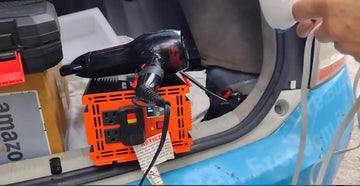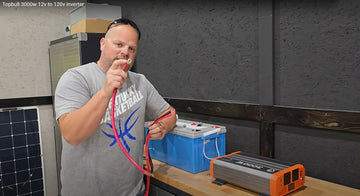RV batteries, as the heart of the power supply, not only affect daily life inside the RV, but also have a direct bearing on the comfort and safety of travelling. Therefore, it is vital to choose a battery that best suits your RV's needs. This article will serve as your guide to help you gain an in-depth understanding and choose the right RV battery.
Types of RV Batteries
The choice of RV (motorhome) batteries is critical for RV travelling and is directly related to the stability and reliability of your RV's electrical system. Of the many battery types available, lead-acid and lithium batteries are two of the most common choices.
Lead Acid Battery
Lead-acid batteries, as a traditional battery type, have a wide range of applications in the RV field due to their mature technology and lower cost. Among them, wet-type lead-acid battery is the most basic one, with flowing electrolyte inside, which requires regular inspection and maintenance, such as adding water and cleaning. Colloidal lead-acid and AGM (Absorbed Glass Mat) batteries, on the other hand, are an improvement on wet lead-acid batteries in that they reduce the risk of electrolyte leakage by curing the electrolyte or absorbing it into a fibreglass mat, and achieve greater stability and longer cycle life. Despite some weight issues, lead-acid batteries remain highly competitive in terms of price/performance.
Lithium batteries
In contrast to lead-acid batteries, lithium batteries are becoming the preferred choice of an increasing number of RV owners due to their high energy density, long cycle life and low self-discharge rate. Lithium batteries are lighter in weight, highly efficient and require minimal maintenance, providing users with more stable and reliable power support. However, lithium batteries are relatively costly and require professional installation and maintenance to ensure their safety. Therefore, when choosing lithium batteries, users need to weigh the relationship between their performance and cost.
Other Batteries
In addition to lead-acid batteries and lithium batteries, there are some other types of batteries available, such as nickel-cadmium batteries and nickel-metal hydride batteries. However, the application of these batteries in the RV field is relatively small, because they either do not perform as well as lead-acid batteries and lithium batteries, or the cost is too high to meet the actual needs of users.
Which type of RV battery is best
The best type of RV battery depends on your needs:
- If you need to camp for long periods of time and have high power needs, lithium batteries may be the best choice, albeit with a higher initial investment.
- If you're on a budget and don't need particularly high power needs, AGM lead-acid batteries are a good choice.
- For occasional campers, traditional open lead-acid batteries are usually sufficient.
Key factors in choosing the right battery for your RV
Battery capacity and power
Choosing the right battery capacity is critical to meeting the power needs of your RV. Capacity is usually measured in ampere-hours (Ah) and indicates the amount of power a battery can store. Calculate the required battery capacity based on the size of the RV, the number and power of power-using devices, and the expected travel time.
It is also important to consider the power output capability of the battery, especially when starting high power devices (e.g., air conditioners, microwaves, etc.). Ensure that the power output of the selected battery can meet the needs of these devices.
Voltage Matching
Most RV batteries are 12 volts, but some high-end devices may require higher voltages (such as 24 or 48 volts). Make sure the voltage of the selected battery is compatible with the RV's electrical system to avoid potential electrical problems.
Cycle Life and Durability
Cycle life is one of the most important indicators of a battery's performance, and it indicates the number of times a battery can maintain its performance during charging and discharging. Selecting a battery with a high cycle life can extend its useful life and reduce the frequency and cost of replacement.
In terms of durability, it is also important to consider how the battery will perform in extreme weather conditions. For example, in hot or cold environments, a battery's performance may suffer. Choose a battery that can perform consistently in these conditions to ensure its long-term reliability.
Weight & Dimensions
Consider the internal space of the RV and the vehicle's load-bearing capacity to select a battery with the right weight and size. Batteries that are too heavy can increase the load on the vehicle, affecting drivability and fuel economy, while batteries that are too large may not fit inside the RV or require additional space to accommodate.
Maintenance and Safety
Lead-acid batteries require regular inspection and maintenance, such as adding water and cleaning the terminals. Lithium batteries, on the other hand, have higher safety requirements and need to be professionally installed and maintained. Understand the maintenance and safety requirements of batteries and ensure you follow the manufacturer's guidelines to prevent potential fire or explosion risks.
Budget and value for money
The cost of batteries varies widely, from a few hundred dollars to thousands of dollars. Choose the right battery for your budget to ensure the best value for money. Also, consider the long-term value of the battery, including factors such as its lifespan, maintenance costs and power efficiency.
Environmental friendliness
It's also important to consider the environmental impact of the battery. Choosing batteries that are recyclable or have a lower environmental impact can reduce the burden on the environment. For example, lithium batteries are typically more environmentally friendly than lead-acid batteries because they do not contain harmful heavy metal substances.
In summary, choosing the right battery for an RV requires a combination of these key factors to ensure that the battery selected will meet the electrical needs of the RV while providing good performance, reliability and safety.
Recommend the best RV battery
Taking all these factors into consideration, we recommend you to choose a stable, reliable and cost-effective RV battery, which is suitable for frequent campers due to its lightweight, high efficiency, long life, and low maintenance needs.
12V 100AH LiFePO4 Lithium Battery for Trolling Motors, Solar System, Marine, RV

This 12V100Ah lithium-iron battery (LiFePO4) is known for its excellent performance and high efficiency. Compared to traditional lead-acid batteries, it has a service life of up to 2,000 to 5,000 charge/discharge cycles, which is 8 to 10 times longer, while the usable capacity is up to twice that of lead-acid batteries. In addition, the weight of the battery has been reduced by approximately 30 per cent, enabling users to enjoy a lighter and more efficient power solution thanks to its high energy density and advanced design.
Equipped with an inbuilt Battery Management System (BMS), the battery offers comprehensive safety measures against overcharging, over-discharging and short-circuiting, as well as high and low temperature cut-offs to ensure safe use in a variety of environments. Its wide range of applications covers home energy storage, UPS backup, electric vehicles, and a variety of portable devices, making it an ideal choice for indoor and outdoor power supplies. In addition, the batteries have good expandability and support parallel and series connections up to 48V and 400AH to meet diverse power needs.
RV Battery Maintenance and Extended Life Advice
RV (motorhome) battery maintenance and extension of service life is a part of RV travelling that should not be ignored. In daily maintenance, the appearance of the battery should be kept clean to avoid corrosion and leakage; the voltage and current output of the battery should be checked regularly to ensure that it is in normal working condition. In addition, reasonable control of battery charging and discharging to avoid over-discharging and over-charging is the key to prolonging battery life.
In terms of charging management, choosing the right charging method and regular equalisation charging can reduce the internal stress and temperature rise of the battery, thus extending the battery's service life. At the same time, avoiding exposing the battery to extreme temperatures and installing it in a reasonable location to provide good ventilation and suitable temperature are also important measures to protect the battery performance.
In addition to routine maintenance and charge management, it is equally important to develop good usage habits. Gentle driving to reduce the instantaneous load on the battery and motor, reasonable use of high-power equipment to reduce the burden on the battery, and regular battery replacement according to battery usage and manufacturer's recommendations are all effective ways to ensure stable RV battery performance and prolonged service life.
FAQs
How do I properly charge my RV battery?
Use a charger that matches your battery type and follow the manufacturer's recommended charge ratio. Avoid rapid charging as this can cause damage to the battery.
How can I tell if my RV battery needs to be replaced?
To determine whether an RV battery needs to be replaced, you can look at the following aspects: first, whether the battery appearance shows signs of cracks, leaks or corrosion; second, use a voltmeter and ammeter to detect the battery's voltage and current output, if the output voltage is below the normal range or the current output is unstable, it may indicate that the battery's performance has deteriorated; lastly, if the battery is frequently under normal use with low battery capacity insufficiently, or dies quickly after charging, the battery may also need to be replaced.
Can my RV battery be left unused for long periods of time?
Yes, but when not in use for an extended period of time, the battery voltage should be checked regularly and the battery should be recharged at regular intervals to keep it healthy. The storage environment should be dry and cool to avoid extreme temperatures.
What should I do if my RV battery is abnormally discharged?
If the RV battery is abnormally discharged, first of all, you need to check whether there is any retrofitted or modified electrical equipment causing leakage. You can check the retrofitted devices one by one and try to remove them to see if the battery discharge situation improves. If the problem remains unresolved, it is recommended to go to a professional maintenance organisation for inspection and repair. In addition, attention should be paid to checking whether the battery connecting wires and terminals are loose or corroded, and whether the battery casing is broken or leaking.

















